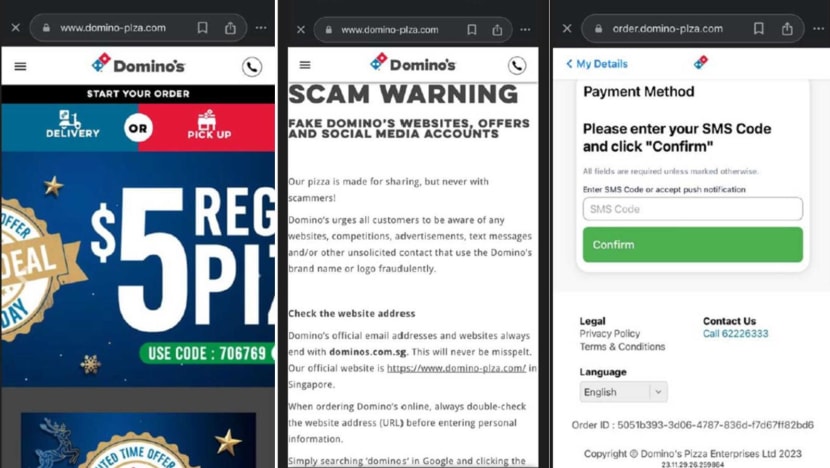Police warn of new phishing scam using fake Domino's Pizza websites
Seven victims have fallen prey to this scam, with losses amounting to about S$27,000.

The phishing websites may resemble Domino Pizza’s genuine website and bear similar URLs and layouts. (Image: Singapore Police Force)

This audio is generated by an AI tool.
SINGAPORE: Police on Saturday (Dec 16) warned of a new phishing scam involving fake Domino’s Pizza websites.
Victims fell prey to the scam when they searched for "Domino's Pizza" online and clicked on an advertisement in the search results.
The phishing websites may resemble Domino Pizza’s genuine website and bear similar URLs, such as domino-plza.com and order.domino.piza.com.
Victims would place an order through the phishing scam websites and enter their credit card details to make payment.
"Victims would realise that they had been scammed after they were notified or discovered unauthorised card transactions made on their debit/credit cards," said the police.
Seven victims fell victim to the scam between Nov 25 and Dec 6, losing about S$27,000 (US$20,200) in total, police said.
On its website, Domino's urged customers to be aware of any fake websites, competitions, advertisements, text messages or "other unsolicited contact" that use its brand name or logo.
"Domino’s official email addresses and websites always end with dominos.com.sg. This will never be misspelt," said the pizza chain.
"When ordering Domino’s online, always double-check the website address before entering personal information. Simply searching ‘dominos’ in Google and clicking the first URL that comes up is not safe."
The company added that it was aware of "a few scams", including those via sponsored Google advertisements.
"Tapping on this sponsored ad will redirect customers to a website to win an award like a gift card. These scams are sent in an attempt to obtain personal information like bank account details, credit card numbers and passwords," said the company.
It added that most of its official social media accounts have a "verified tick" next to the account name.
A Google spokesperson said the company is in touch with the police and has taken action on the reported fraudulent ads.
"Should users notice or suspect any ads to be fraudulent, they can report it by clicking on the three dots at the top right hand corner of the ad," added the spokesperson.
Police advised members of the public to install the ScamShield App and add security features such as two-factor authentication (2FA) or transaction limits for internet banking transactions.
“Look out for telltale signs of a phishing website and if the deal is too good to be true, it probably is,” police said.
“Check with the company on its official website if such deals are available and check your card transactions before approving them.
“If in doubt, never share your personal information and payment card details with anyone.”












